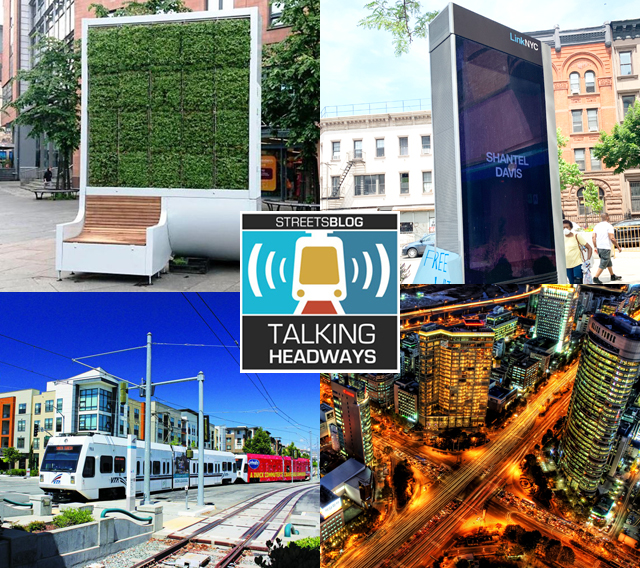This week we’re joined by Shannon Mattern, professor of anthropology at the New School for Social Research, who talks with us about her new book, "A City is Not a Computer: Other Urban Intelligences." We discuss the ideas of smartness versus wisdom, maintenance as a way of absorbing information, and the city as a processing machine.
For those of you who get your news through your eyes and not your ears, there’s an edited transcript below the audio player. If you want a full, unedited transcript (with some typos!), click here. If you want to listen, here you go:
Jeff Wood: I was really drawn at the start to this idea of a tree versus a lattice structure in cities. I’m wondering, what do you think created the original semi-lattice construct of cities that you discussed in the book?
Shannon Mattern: We are referring to Christopher Alexander’s idea. So I wrote a piece, I don’t remember exactly when it came out, called "A City is Not a Computer." That article came about because I was invited by another group of editors to contribute a book chapter where I was tasked with writing about how a city is an information-processing machine. As I was researching it I realized, yes, there are lots of kinds of computational dimensions that happen in cities that it runs on data, that accountancy and logistics are integral parts for cities to function. But reducing a city to an information-processing machine really brackets out a lot of the other, really more important, epistemological functions and knowledge and wisdom that is inherent in a city.
So I essentially submitted to them the opposite of what they asked for. I wrote about how a city IS like an information-processing machine, but it’s more, hence the article, "A City is Not a Computer," which came out in Places. Then somebody reminded me after the fact that Christopher Alexander, who, as you probably know, is an architect whose work has been very influential to computer programmers and designers across the wide array, wrote a piece called, "A City is Not a Tree." In that piece, he contrasts the idea of a city as a tree form, which is a kind of a symmetrical, heavily designed, regimented type of master planning, versus the cities as semi lattice, which is more organic, really tightly interwoven. It’s more a formal contrast, but it also implies a different way of designing cities, a different way of understanding how cities function.
So those are where those two ideas came from the city as a tree, versus a semi lattice. If you think about organic organization before the age of master planning — well, actually I can’t say that, master planning we tend to associate with the mid 20th century — but if we look at a lot of prehistoric and historic cities, you have a ruler or a cosmology that’s defining the way cities are are laid out. That’s a proto master plan in a way. But the medieval cities with the intersecting streets and picturesque alleyways that we tend to fetishize in some cases, those tend to be more emblematic of the "semi lattice." So I’d say, that throughout history, we’ve had multiple examples of both tree-like planning processes and semi lattices that have emerged more organically.
Wood: It’s really interesting talking about the two, because I had this discussion when I was working at a think tank called Reconnecting America. We did Transit Oriented Development policy and worked a lot with HUD and FTA and others. My colleague was always against this kind of typology, if A equals B, then B equals C, this goes into this, which is like the tree thinking, and I was more formatted toward the tree thinking. So I think, how do our brains kind of respond to this? As humans, we want to put things into those diagrams and we want to put them into simpler forms, but in the book you even mentioned, our mind can’t really see the complexity and diagrams or the complexity in cities through a diagram. I was curious by that too, because my thinking and previous trying to make sense of the world or make sense of cities kind of went more toward that tree thinking rather than that semi lattice, the organic, the unknowable to a certain extent.
Mattern: Yeah. So there is a presumption [in favor of] more legible forms, and a tree has historically been a very legible topology way of organizing spaces and information and genealogies and all kinds of complex systems, social, cultural, political, economic, spacial, et cetera. So there is an assumption that by organizing things in more regimented, master-plan ways, it’ll make it a more legible form for people, but there’s also all the critique; there’s been decades of critique of master planning. When you impose an order on people, it really creates an artificial sense of order on modes of living and forms of social practice that are a lot more productively messy than that. In many cases, as with the case with Brasilia, for instance, you have people who rebel against it, or the situationists who push against the grid and push against the master plan.
So there are presumptions that having a more clearly defined order will make things easier, but it’s also a form of social and spatial engineering as well. So there are more nefarious purposes for imposing a "tree structure," for the purposes of social control, but there are also more benevolent or seemingly benevolent purposes, and that is creating a space that makes more sense to people, or at least that’s the assumption.






